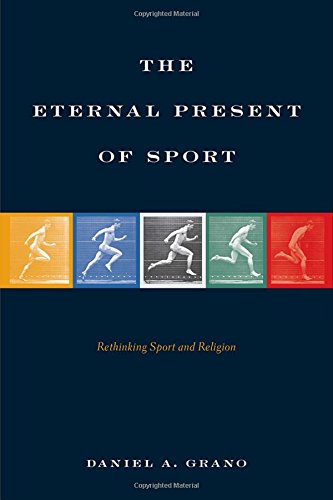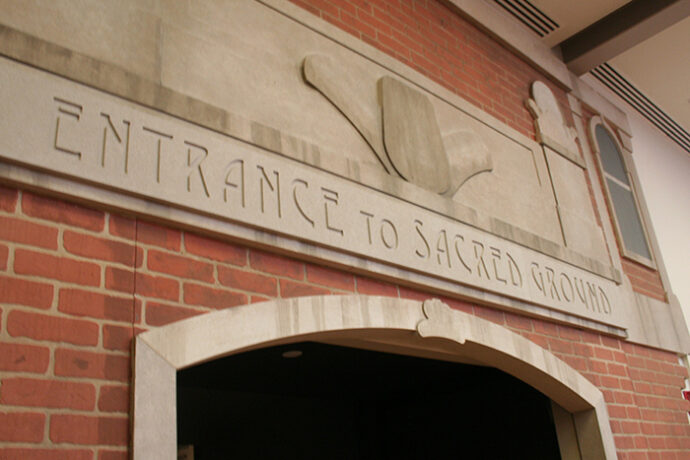What inspired you to write The Eternal Present of Sport: Rethinking Sport and Religion?
A recurring argument in sport studies (and popular commentaries as well) is that sport is a form of “civil religion” that creates social cohesion around shared values and rituals. There’s this constant image of fans transcending political differences as games transport them from “profane” to “sacred” time. That image has been criticized effectively by scholars from multiple disciplines. But I wasn’t sure I had anything to say on the subject until I ran across critiques of religion associated with thinkers in the Frankfurt School (e.g., Walter Benjamin, Max Horkheimer, Theodor Adorno). They argued that religion serves as a way of imagining a radically or “wholly other” alternative to the present state of affairs (suffering, injustice), but that this potential is compromised as religion gets into bed with the state and other sources of political power.
Even so, the potential to rethink history is stored up in religious images and tropes; it can be recovered and mobilized for purposes of social change. This is an aspect of religion that I have always found personally compelling, and you see it becoming more prominent in contemporary critical theory and philosophy: the idea that religion is a storehouse for radically alternative images and ideas. We’re speaking mainly of “religion” in figurative terms here; its images are being appropriated to a secular, materialist political program. But there are connections between materialist politics and “formal” religious traditions as well (going back to the Frankfurt School). Liberation theology is a good contemporary example.

The Eternal Present of Sport: Rethinking Sport and Religion
Daniel Grano
Temple UP
June 2017
So, what does this have to do with sport? I started to think about how crises in elite sport were taking shape around foundational religious ideals. To cite a couple of examples from my book: fans and sportswriters have long emphasized how elite athletic accomplishments prove we can “transcend” previously-held limits in human potential, yet performance enhancement (doping, prosthetics) visibly shifts the bases of that transcendence from human to extrahuman sources of agency; or, live sport broadcasts remain the most valuable television commodity in the world in large part because of religious ideals surrounding the “witnessing” of history, but contemporary media technologies (especially instant replay) train viewers to question leagues’ and governing bodies’ authority over determining outcomes and writing histories.
I noticed that religious tropes were operating within several major sporting crises—in, for example, the concussion crisis in the NFL or the deterioration of the amateur ideal in college athletics. And I thought that conceptualizing religion as a source for imagining a “wholly other” future could serve as a powerful way to understand foundational social and political changes taking place in sport.
What’s the most important take-home message for readers?
 Religion is a source of crisis in sport. What I am mainly pushing back against is the idea that sport is “religious” insofar as it provides an escape from politics. This argument takes a couple of basic forms, depending on one’s perspective. Academics or popular critics interested in radical social change often characterize sport as an opiate that obstructs emancipation. Conversely, scholars, theologians, or media commentators sympathetic to sport often celebrate its capacity to transcend political and social divisions. I try to move away from both of these positions in order to think about sport-religion relationships in dialectical terms. That is, I think that the sport-religion relationship is made up of contradictions and antagonisms that, at specific historical moments, become uniquely visible and shape meaningful social change. I think we’re going through such a moment now.
Religion is a source of crisis in sport. What I am mainly pushing back against is the idea that sport is “religious” insofar as it provides an escape from politics. This argument takes a couple of basic forms, depending on one’s perspective. Academics or popular critics interested in radical social change often characterize sport as an opiate that obstructs emancipation. Conversely, scholars, theologians, or media commentators sympathetic to sport often celebrate its capacity to transcend political and social divisions. I try to move away from both of these positions in order to think about sport-religion relationships in dialectical terms. That is, I think that the sport-religion relationship is made up of contradictions and antagonisms that, at specific historical moments, become uniquely visible and shape meaningful social change. I think we’re going through such a moment now.
The other thing would be an emphasis on how elite athletes serve as objects of religious adoration who embody utopian cultural images (e.g., the continuous transcendence of human potential, the purity of the “amateur ideal”) alongside the betrayal of those ideals (e.g., doping, the NCAA’s obvious greed). I argue throughout the book that looking at and admiring athletic performances also means paying constant attention to this dual focus between the highest religious ideals of sport and their instantiation in labor, health, racial, gendered, and institutional practices.
Is there anything you had to leave out?
I feel like everything that was important to me made it into the book. There are a couple of places where I abbreviated discussions that I could gave gone on and on about. My chapter on performance enhancement features a treatment of transhumanism, for example, that I could probably build another book project out of. We ended up getting the book to just over 200 pages (in the main text, before notes). I’m really happy about that. Short books are good. People are busy.
What are some of the biggest misconceptions about your topic?
“Elite sport constantly disrupts categorizations around race, gender, sexuality, and ability, publicizes health care and labor injustices, integrates media, medical, and military technologies into our everyday experiences, and forces us to rethink what is really human about the human body.”
First and foremost is the idea that sport has nothing to do with meaningful (much less radical!) political change. Religion is an especially powerful container for that misconception. In fact, elite sport constantly disrupts categorizations around race, gender, sexuality, and ability, publicizes health care and labor injustices, integrates media, medical, and military technologies into our everyday experiences, and forces us to rethink what is really human about the human body. It is a uniquely powerful context for social change. More and more academics and popular commentators are recognizing this, and that makes it an exciting time to do sport-related scholarship.
Second would be the idea that the relationship between sport and religion is best understood by dividing between “sacred” and “profane” experiences, or between “civil” and denominational religious practices. Scholars from various disciplines have challenged these binaries, and I extend upon those challenges in my book. The main problem with these divisions is that they lead to misunderstandings about the current relationship between sport and religion, in both practical and political terms. Practically speaking, there isn’t much of a dividing line between denominational religion and commercial sport, or (more figuratively) between the profanity of commerce and the sacredness of religious gathering. Evangelical groups give away bobblehead dolls of Biblical figures at Major League Baseball “Faith Nights.” UFC fighters proselytize in the octagon after bloodying their opponents. Not everyone is comfortable with this state of affairs. Theologians lead thoughtful debates about the ethics of public prayer in sport, for example. But for all practical purposes sport represents an ongoing reconciliation between religion and the market. Politically speaking, there is, I think, less and less room to claim the potential for “sacred” escape via sport. Think about increases in athlete-activism, or complaints about the supposed liberalism of major media companies like ESPN. Consuming sport today means consuming political conflict. In previous eras it might have been easier (though still problematic) to argue that the sacred formed a barrier against sport’s most explicit commercial and political practices. In the 21st century, that barrier has clearly collapsed.
Did you have a specific audience in mind when writing?
This is an academic book targeted to interdisciplinary scholars interested in sport, religion, politics, and media. I would love it if general readers found it informative, and I do think that once you get past the early theoretical stuff (really just the first chapter) the case studies—“greatest ever” list shows, instant replay, performance enhancement, the NFL concussion crisis, and “pay for play” debates in the NCAA—are familiar and readable. But this book will be most useful to academics. I hope to make an impact on scholarly thinking about religion and sport, and I’ll be especially gratified if instructors are assigning it in their classes.
Are you hoping to just inform readers? Entertain them? Piss them off
I never set out to explicitly piss off readers, because I think that’s an annoying way for academics to make a name for themselves. Perhaps my argument will irritate some people, because I am pushing back against a line of thought about sport and religion that has been prominent in the sport culture literature for a long time. But that isn’t my aim. More than anything I hope I have written something that proves useful to other people interested in critical studies of sport. I hope readers respond by saying “that’s interesting,” “I can use this in my own work,” and (if they’re teachers) “I can assign this to my students.”
What alternative title would you give the book?
I thought for a minute or two about calling it Sport and Negative Theology, which would have been search-friendly but also would have been pretty boring and overly technical.
How do you feel about the cover?
I’m thrilled with it! It features a series of photographs of a runner taken by Eadweard Muybridge. Muybridge was famous for his innovations in high-speed photography, and is often credited as the inventor of the moving image. Athletic motion (that of horses, acrobats, runners) was a common subject of his experiments and public lectures. I focus quite a bit in my book on the relationship between athletic movement and audiovisual capture, and argue that this relationship lies at the heart of sport’s “religious” qualities. So, a Muybridge series is just perfect for the cover.
Is there a book out there you wish you had written? Which one? Why?
If we’re talking about academic books, my pick would be John Durham Peters, Speaking into the Air: A History of the Idea of Communication. It’s beautifully written, imaginative, and endlessly useful, all of the things I admire most in scholarly writing.
What’s your next book?
I am currently working on a co-edited volume with Michael Butterworth (at the University of Texas, Austin) on sport and political struggle that we are very excited about.


